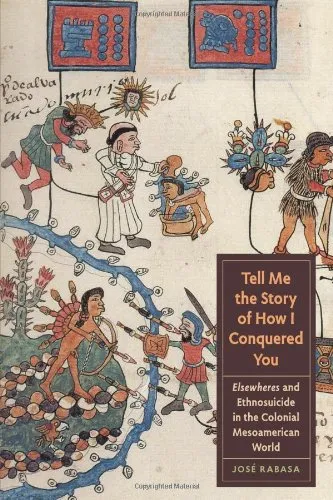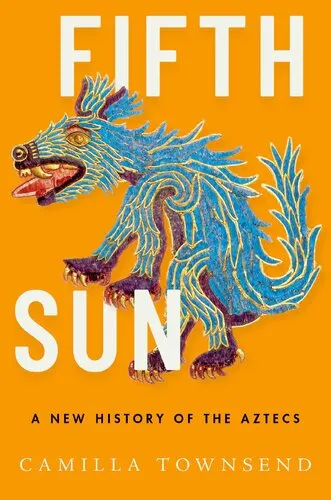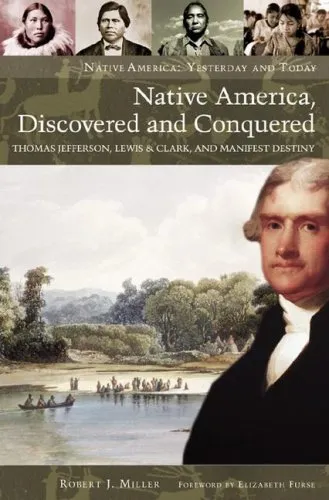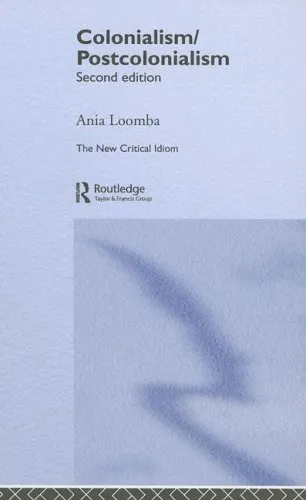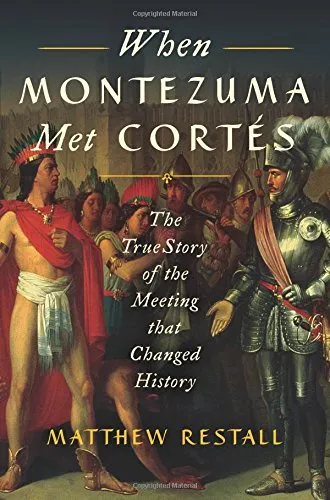Tell Me the Story of How I Conquered You: Elsewheres and Ethnosuicide in the Colonial Mesoamerican World (Joe R. and Teresa Lozano Long Series in Latin American and Latino Art and Culture)
4.7
بر اساس نظر کاربران

شما میتونید سوالاتتون در باره کتاب رو از هوش مصنوعیش بعد از ورود بپرسید
هر دانلود یا پرسش از هوش مصنوعی 2 امتیاز لازم دارد، برای بدست آوردن امتیاز رایگان، به صفحه ی راهنمای امتیازات سر بزنید و یک سری کار ارزشمند انجام بدینکتاب های مرتبط:
مقدمهای بر کتاب «Tell Me the Story of How I Conquered You: Elsewheres and Ethnosuicide in the Colonial Mesoamerican World»
کتاب «Tell Me the Story of How I Conquered You» از نویسنده خلاق و متفکر، زوزی راباسا، به بررسی چندلایه و عمیق جهان مکسیکوی استعمارزده میپردازد. این اثر، که بخشی از مجموعه معتبر 'Joe R. and Teresa Lozano Long Series in Latin American and Latino Art and Culture' است، به صورت خارقالعادهای به تحلیل تناقضات و چالشهای فرهنگهای بومی و تغییرات ناشی از استعمار اسپانیاییها در دوره استعماری مکسیکو میپردازد.
خلاصهای جامع از کتاب
کتاب «Tell Me the Story of How I Conquered You» به کاوش در تجربیات بومیان مکسیکو و تأثیرات مهاجمان اسپانیایی بر فرهنگ محلی میپردازد. راباسا با ترکیبی از مطالعات تاریخی، تحلیل فرهنگی، و روایتشناسی، پنهانکاریها و استراتژیهای مقاومت بومیان در مقابل استعمارگران را بررسی میکند. این کتاب نشان میدهد که چگونه مردمان بومی با از دست دادن هویت و فرهنگشان همراه با قدرتهای استعماری مقابله میکردند و چگونه این مقاومتها به Ethnosuicide انجامید.
نکات کلیدی
- بررسی تاثیرات تخریبی معاصر استعمار بر فرهنگهای بومی.
- مطالعه درباره فرایندهای مقاومت و بقا در مواجهه با نیروهای استعماری.
- بررسی مفهوم Ethnosuicide و تاثیران آن بر جامعههای بومی مکسیکو.
- استفاده از متون تاریخی و منابع محلی برای بازسازی روایات بومی.
جملات معروف از کتاب
"استعمار یک قهرمانی از جنس ویرانی است که تنها با بقای قدرت، دستاوردهایش تبلور مییابند."
"هیچ چیز در تاریخ به اندازه فرهنگی که بخواهد خودش را بازیابی کند، زنده نمیماند."
چرا این کتاب مهم است؟
«Tell Me the Story of How I Conquered You» به عنوان اثری نوین و ژرف، به روشنی نشان میدهد که چگونه استعمار نه تنها از طریق قدرت نظامی بلکه از طریق تغییرات فرهنگی و زبانی به مردمان بومی آسیب رسانده است. این اثر به خوانندگان کمک میکند تا پیچیدگیهای تاریخ فرهنگی مکسیکو و مقاومت تحملناپذیر بومیان را درک کنند. به علاوه، این کتاب با بررسیهای دقیق خود، به پرسشهایی بنیادی در خصوص تغییرات فرهنگ، هویت و مفهوم Ethnosuicide، و چگونگی فائق آمدن بر آنها میپردازد.
Introduction
Welcome to a journey through the complex layers of history and colonial narratives illustrated in the book 'Tell Me the Story of How I Conquered You: Elsewheres and Ethnosuicide in the Colonial Mesoamerican World'. Authored by José Rabasa, this work meticulously dissects and reconstructs the Mesoamerican colonial world to reveal how the discourse of conquest shapes our understanding of history and identity.
Detailed Summary of the Book
José Rabasa delves into the narratives of conquest, employing the term "ethnosuicide" to address the profound cultural impacts inflicted upon Mesoamerican societies. With an analytical lens, Rabasa critiques how colonial texts have been traditionally interpreted, challenging readers to reconsider whose stories are privileged in the historical discourse. Through Rabasa's examination, the notion of how these societies' cultural reproduction was systematically disrupted becomes evident, offering a rich exploration of both written and unwritten histories.
By revisiting Spanish chronicles and indigenous accounts, Rabasa identifies the fallacies and gaps within these narratives, offering perspectives from the "Elsewheres"—those more marginalized voices of conquered peoples. His work explores how colonial encounters induced a metaphorical and literal conquest of Mesoamerican consciousness, resulting in what he describes as "ethnosuicide," or the intentional obliteration of cultural identity and heritage.
Key Takeaways
- A critical analysis of colonial texts reveals the inherent biases of conquerors.
- Understanding the concept of elsewheres highlights marginalized perspectives and histories.
- Ethnosuicide underscores the intentional erasure and transformation of indigenous cultures.
- Reconstructing historical narratives allows for a more nuanced understanding of identity and cultural survival.
Famous Quotes from the Book
“To conquer a people is to demand a new voice from them, yet what voice remains when that demand seeks to silence the myriad others?”
“In the shadows of colonization dwell the stories of resistance, unchronicled yet resilient, echoing through time.”
Why This Book Matters
This book is crucial because it revises the canonical narratives of history that often overlook the intricacies of cultural interplay between colonizers and the colonized. Rabasa's work empowers current and future generations to re-evaluate historical events through a lens that prioritizes depth and multiplicity of perspectives. It serves as a catalyst for dialogue about identity, power, and representation, urging us to reconsider how history is written and remembered.
The book is also an essential contribution to Latin American studies, providing an academic framework to better appreciate the resilience and transformation of indigenous cultures, countering the colonizing narratives that have dominated scholarship for centuries. It asserts that understanding these histories is key to reshaping the narratives of global history beyond monolithic perspectives.
دانلود رایگان مستقیم
شما میتونید سوالاتتون در باره کتاب رو از هوش مصنوعیش بعد از ورود بپرسید
دسترسی به کتابها از طریق پلتفرمهای قانونی و کتابخانههای عمومی نه تنها از حقوق نویسندگان و ناشران حمایت میکند، بلکه به پایداری فرهنگ کتابخوانی نیز کمک میرساند. پیش از دانلود، لحظهای به بررسی این گزینهها فکر کنید.
این کتاب رو در پلتفرم های دیگه ببینید
WorldCat به شما کمک میکنه تا کتاب ها رو در کتابخانه های سراسر دنیا پیدا کنید
امتیازها، نظرات تخصصی و صحبت ها درباره کتاب را در Goodreads ببینید
کتابهای کمیاب یا دست دوم را در AbeBooks پیدا کنید و بخرید
1453
بازدید4.7
امتیاز0
نظر98%
رضایتنظرات:
4.7
بر اساس 0 نظر کاربران
Questions & Answers
Ask questions about this book or help others by answering
No questions yet. Be the first to ask!
